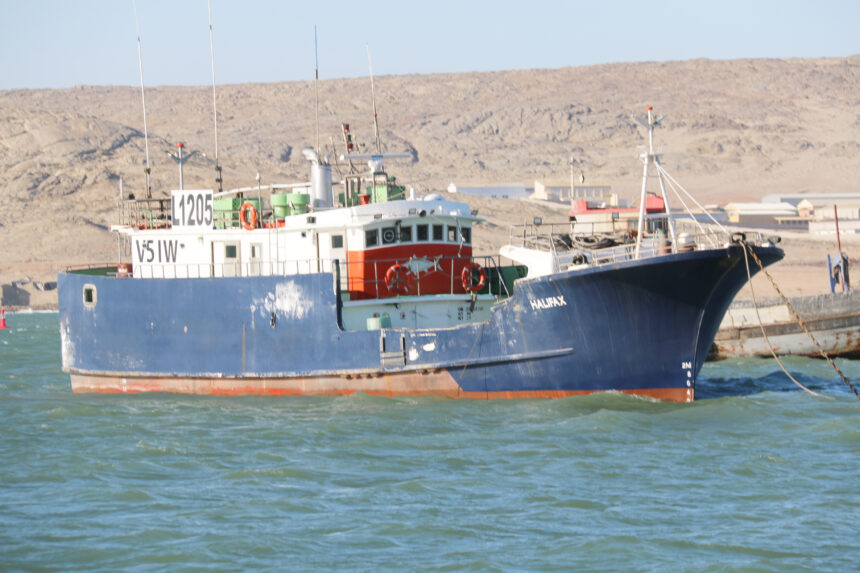The port city of Lüderitz is experiencing an industrial awakening because of the recent discoveries of offshore oil and gas reserves, and an ambitious N$10 billion green
hydrogen development near the city.
New Era journalist Paheja Siririka (PS) sat down with the town’s mayor, Phillippus Albertus Balhao (PAB), for a one-on-one discussion on the town’s development and preparation for the expected economic boom.
PS: What are the prominent developments that have taken
place in Lüderitz?
PAB: The council has made allocations of residential erven, complemented by industrial land sales and the envisaged port expansion, a key intervention to unlock the town’s economic growth potential. The townlands expansion project and its rate of success in terms of an advanced rate of progression are exciting prospects towards accommodating the industry giants and employees. The formalisation of our informal settlements through the Flexible Land Tenure has positively impacted our townland planning schemes, which will result in a shack-free town in the not-too-distant future.
PS: What are the successes
and challenges of these projects?
PAB: Successes – The high demand for residential and business erven has placed the council under immense pressure to accommodate aspiring investors to the town. To this, end the council has developed an Infill and Densification Strategy and Policy. Through this, we aim to identify and
unlock feasible land within the current approximately 11 000 hectares of land that we can allocate to the industry and families, while we await the townland expansion process to take shape.
Challenges – Water demand is a huge challenge, as the current aquafer can only cater to the current demand. However, the envisaged influx of industry and residents will require more water. Investments in water infrastructure are a high priority for the council and its stakeholders.
PS: Overall, how is development
in the town?
PAB: The council is pleased to highlight significant growth within our town, with an ever-increasing investor appetite to make Lüderitz their operational base. Procurement bids have been issued to prepare the town to re-engineer our infrastructure in response to the current needs and future demands of our people. Master-plans are being conceived for all aspects of service delivery to review our current service offerings with the view of enhancing and improving service delivery efforts.
PS: Why should people
invest in Lüderitz?
PAB: Our town offers investors an able and ample workforce, complemented by the ease of access to and from our town via the sea, air, road and rail. Furthermore, council offers the best rates in terms of land sales, and a conducive environment for the co-existence of business enterprise and society.
PAB: Many councillors have complained about the small subsidy from central government. What has Lüderitz done to continue its programme, despite that hurdle?
PAB: The town council has, despite the inadequate provisions, made headway in ensuring service delivery. The servicing of residential plots has been completed with various road upgrades and maintenance. The council has adopted the principle of “do more with less” with the little resources allocated to it. We are now positioned to accord over 140 families with an erf to build their homes, with the further provision of commercial erven for the establishment of business enterprises through the bulk service provision of industrial land of over 20 hectares.
The government has further committed N$93 million for capital projects for the financial period 2024/25 to capacitate council to prepare its infrastructure for the impending townland expansion. Thus, the inadequate allocation is now something of the past.
PS: How would you classify
the crime rate in your town,
and what mechanisms are in
place to minimise it?
PAB: The current crime rate is managed through partnerships with the Namibian Police, Neighbourhood Watch and the
Security and Safety Forum. Most cases reported are predominantly theft and housebreaking. To complement safety and security efforts, a satellite police station will be set up in one of our localities, serving the masses.
PS: How many schools and healthcare facilities are there?
Are they sufficient?
PAB: There are three primary schools and two high schools, which are run by the state. We also have three private schools. We have
one primary health-care clinic and a state hospital.
We are busy constructing a primary school to cater for the ever-increasing demand, as
the schools are full, and there is a need to create more space to accommodate more children with the huge influx of parents into the town. Some schools have created makeshift classrooms to cater to the increased demand, which currently exceeds supply.
The healthcare facilities are not offering specialised services, and thus we welcome the envisaged establishment of private healthcare service provision to complement the only state-owned healthcare facility in the town.
This is done with the view to enhance the quality of life of our residents, and aid in support of a healthy workforce.
PS: It seems there is no management committee because of logistical issues. How has the town been managing its affairs, considering that some politicians have their interests at heart compared to those of the people?
PAB: The Council Management Committee is active and compliant with the mandatory statutes, as enshrined in the Local Authorities Act 23 of 1922 (as amended). All members of the council serve the residents and stakeholders of Lüderitz without fear or
favour, and we as councillors don’t place our interests ahead of those of our constituents.
PS: Let’s slightly move on to elections. How has the registration of voters been going?
PAB:We await the statistics on the registered voters to reflect on the rate of uptake of potential voters. More voter education is required to entice eligible voters to
participate in the voting process.
PS: Why should the residents of Lüderitz register to vote?
PAB: To participate in the decision-making process, take charge of the developmental trajectory and pace, and add their voices to the country’s development agenda.
-psiririka@nepc.com.na


